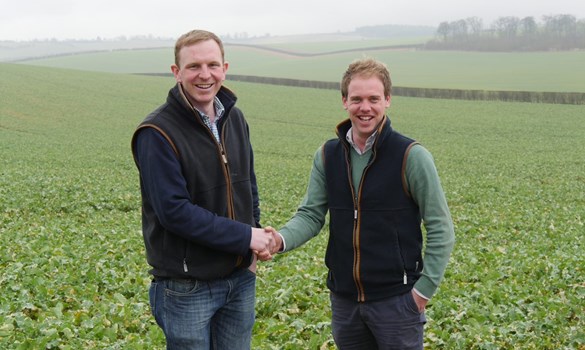Soils and rooting: Duxford
Soils and rooting
Duxford Monitor Farm meeting
With a focus on biomass above ground, how much more can we learn about optimising rooting below ground?
Join us to hear the science behind the conversation in these important areas of soils and rooting.
This meeting will:
- Offer a practical look at how to increase rooting in order to improve moisture uptake on soils
- Look at how to assess your soils in a consistent manner using the new soil health card
- Examine soil approaches with a visit to Duxford Monitor Farm host Tom Mead and David Walston’s farms, along with an insight into David Walston’s new conservation agriculture research.
Prof. Karl Ritz, University of Nottingham, and Elizabeth Stockdale, NIAB, will join us to provide scientific views alongside a practical approach.
Speakers and topics
- Professor Karl Ritz, University of Nottingham: rooting
- Elizabeth Stockdale, Niab: Soil Health Scorecard
Programme
- Registration with coffee and bacon roll
- Welcome and introduction: Teresa Meadows, AHDB
- Farm update: David Hurst and Tom Mead, Duxford Monitor Farmers
- Rooting – how to optimise: Prof. Karl Ritz, University of Nottingham
- Soil health scorecard – an introduction: Elizabeth Stockdale, NIAB
- Refreshment break and travel to the barn
- Farm Walk to look at Tom Mead and David Walston’s fields: Tom Mead, David Walston and Elizabeth Stockdale
- Soil health assessments using the new scorecard
- Soil Biology and Soil Health Partnership
- Conservation Agriculture research
- Hybrid wheat
- Meeting summary and close: Teresa Meadows, AHDB
- Depart
For more information:
Please contact Teresa Meadows by e-mail teresa.meadows@ahdb.org.uk or call 07387 015465.
About Duxford Monitor Farm
Tom Mead and David Hurst are hosting the Duxford Monitor Farm together. They farm within nine miles of each other at the Hertfordshire/ Cambridgeshire border and their land is joined by the old Icknield Way. With different businesses but common goals and problems, the jointly-hosted Monitor Farm will provide an opportunity to look at collaboration, farm management and business resilience from two different perspectives.
Tom Mead is a partner at Bleak House Farm in Cambridgeshire. The family farm has 377ha of arable cropping, growing wheat, barley, oats and oilseed rape, as well as sugar beet. They use a mixture of ploughing and minimal tillage cultivation, aiming to cultivate as shallow as possible when the conditions allow. The farm has storage capacity for around 2,000 tonnes. Winter barley and OSR are generally sold at harvest and wheat and oats are stored longer and marketed between harvest and the following spring. Tom is a graduate of the Tesco Future Farmers programme and is particularly interested in running an efficient farm business on a small scale. He also wants to find ways to push the business forward, looking in detail at soils, how to stay profitable, focus on the customer and maintain a good work-life balance.
David Hurst is the arable manager at Law Farming in Hertfordshire. He manages 1,355ha of arable cropping including rye, wheat, barley, oats, spring barley, forage rape, spring mustard and sugar beet. The farm also has a 1,750 head sheep flock, rents land out for pigs and there are plans to introduce cattle back on to the farm. There are three full-time staff and a harvest student. The farm is ploughed for grass leys and winter and spring barley, but a one pass operation is used elsewhere. David’s ambition for the business in the short term is to continue to reduce fixed and variable costs, without affecting productivity or the quality or value of output. During the Monitor Farm programme, David is looking forward to learning from other farmers and wider industries across the supply chain.
For more information please visit the Duxford Monitor Farm page


